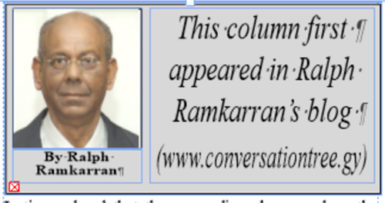Two Fridays ago a seminar on Constitutional Reform the Process, was held at the University of Guyana. The event, which was well attended, was organized by the Carter Center and facilitated by the British High Commission. The PPP and a cross-section of civil society were represented, but conspicuously absent was any APNU or AFC party or government representatives. The discourse focused on why there should be constitutional reform and the process by which it should be undertaken. The event was not intended to have a formal conclusion but to have Guyanese ownership.
 Many ills of the society that needed redress were identified. There were concerns that elected officials were interfering in the democratic right to protest, of political intermeddling in Amerindian affairs, of the need for equity in the society, of implementing the existing provisions of the Constitution, of educating young people about the issues, and everything in between. The debate around the issues raised was lively and energetic. The fact that the audience remained attentive and engaged throughout the three-hour event suggested that there is much interest in constitutional reform and scope for more debate.
Many ills of the society that needed redress were identified. There were concerns that elected officials were interfering in the democratic right to protest, of political intermeddling in Amerindian affairs, of the need for equity in the society, of implementing the existing provisions of the Constitution, of educating young people about the issues, and everything in between. The debate around the issues raised was lively and energetic. The fact that the audience remained attentive and engaged throughout the three-hour event suggested that there is much interest in constitutional reform and scope for more debate.
One of the issues raised was the debilitating impact of ethno-political competition on governance. The possibility of constitutional reform creating structures that would result in the reduction of political suspicion and enhancing the level of cooperation was explored. Reference was made to the organizing principle of unity of the 1950 PPP, the PPP’s proposals for a coalition government with the PNC during the 1960s, then for a Patriotic Front Government in 1978, for a ‘winner does not take all’ system during the 1980s up to 1991 and the PNC’s proposals for shared governance in 2002. It was pointed out that the split of the PPP in 1955 resulted in ethnic voting since the 1957 elections, that this division has been politically exploited and is the major hindrance to our social and economic development up to the present time.
The struggle for constitutional reform as a means to attain a political solution to Guyana’s sharp ethno-political divisions remains a burning necessity, which is broadly supported by the Guyanese people. It is this yearning that keeps alive the periodic courtship for political unity between the main political parties. Constitutional reform is now even more important at this crucial time when Guyana’s coming oil wealth will increase challenges to transparency and good governance. An agreed political structure that allows for participation of both parties in governance, while maintaining political competition and their separate identities, will create political legitimacy, end discrimination, reduce corruption, introduce more transparency, facilitate an agreed economic policy, establish equitable distribution of economic resources, tackle disadvantages or perceived disadvantages of groups, protect the environment and provide for a green economy. Although major reforms were adopted in the 1999-2000 constitution reform process, the failure to find a political solution left many feeling unfulfilled. And this continues to drive the clamour today.
The APNU+AFC in its 2015 Manifesto has made the boldest proposals for a political solution ever to have been introduced onto Guyana’s political agenda since 1950. The manifesto under ‘Constitutional Reform,’ stated:
“In the Cummingsburg Accord, APNU and the AFC are committed to the establishment of a Constitution Reform Committee with a mandate to complete consultations, draft amendments and present same to the National Assembly for approval within nine months. Areas which we will recommend for consideration by the Committee include:
- The President should be elected by a majority of electors.
- There should be separate elections for the presidency and National Assembly.
- Executive powers should be shared between the President, Prime Minister and the Cabinet.
- The Cabinet should comprise members of the parties which have achieved at least 15% of the vote at the national elections.
- The supreme organs of democratic power should be the President and the National Assembly.
- The Prime Minister shall be the person who secures the second highest votes in the presidential elections.
- The executive powers and responsibilities of the Prime Minister should be increased to include some executive powers and responsibility over the Cabinet.
- The members of the Cabinet are subject to the approval of, and removal by, the national assembly.
- The immunities of the President are to be reduced.
In attempting to fulfil its mandate, the government appointed the Hughes’ Committee to examine the process for constitutional reform. It reported about a year ago. The report is still before the Cabinet and the process appears to have been stalled. This has led to speculation that the government has lost interest in constitutional reform, even though it allocated $80 million to constitution reform and appointed Prime Minister Nagamootoo to lead the process.
If the speculation is not justified, the government can demonstrate its bona fides by tabling a motion in the National Assembly seeking support for its Manifesto proposals and the Hughes Report. I believe that such a move will meet with the overwhelming support of the Guyanese people.





